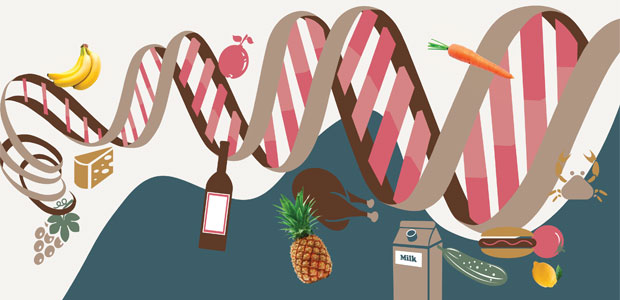Advertisement
The Nutrigenomics Frontier
How food interacts with genes

A new body of science may be about to change the way we think about diet—and may customize the nutritional advice we receive. Introducing: nutrigenomics.
For every person who maintains their health by fastidiously avoiding saturated fats, there’s another person who regularly indulges in butter and bacon with impunity. Clearly, a given food doesn’t have the same consequences for everybody. That’s because everyone has a different genetic makeup.
Human genetic variation is part of how we adapted to survive in the face of a sometimes scant and unpredictable food supply, but most current nutritional research has not taken genetic variables into account. One-size-fits-all nutritional advice—like that in Canada’s Food Guide—may indeed apply to the majority of the population, but it falls short of capturing the entire story.
Diet and genes interact
A new body of science is set to change the way we think about diet: nutrigenomics. As the study of two-way interactions between diet and genes, nutrigenomics recognizes that everything we eat, from celery to french fries, has a unique composition of nutrients and micronutrients that can communicate with our genome.
Genes, of course, are not a fixed blueprint for health outcomes; our environment, including the foods we choose to put into our mouths, can shape how the genetic information functionally plays out. Different genes mean different requirements for, and responses to, nutrients.
The task for genomics researchers is to figure out which diseases can be mitigated or prevented by diet: that is, can certain foods alter the molecular processes that precede a full-fledged health problem? If you have a gene that predisposes you to a certain form of cancer, for example, can you avoid the cancer by eating more cabbage? By eating less beef? Maybe.
Targeted nutritional therapy ahead?
Brad Popovich, chief scientific officer at Genome BC and a licensed clinical molecular geneticist, says that genome research could fundamentally change our picture of human health in the decades ahead by allowing targeted nutritional recommendations based on genotype.
“What genomics can help to do is to bring the right therapy to the right patient at the right time,” he says when reached by phone. “I think that is what we’re all working toward. And genomics is the tool that’s empowering us to get there.”
While Popovich stresses that nutrigenomics research is at a very early stage, he says that clinical applications could one day range from cancer prevention to cholesterol control.
“If you knew your genetic profile was such that, in fact, [eating a certain food] was going to catch up with you way earlier than somebody else, it may make you stop and think,” he says.
DNA-profile buyers beware
Consumer genetics companies currently offer to sequence a client’s DNA for a fee; many provide follow-up recommendations for lifestyle changes that may help reduce the risk of health problems.
But Popovich warns that the scientific validity of such recommendations will take time to develop. As a professional licensed to make sense of the information, based on available science, he says that currently about 99 percent of the genetic information in a DNA analysis cannot be interpreted.
Dietitians are among the primary professionals facing the complex task of using nutrigenomics research practically and responsibly in the years ahead. Liz da Silva, a registered dietitian, researcher, and dietitian educator, says that she has yet to hear of a person walking into a dietitian’s office armed with his or her DNA analysis.
“We never have genetic information about our clients. That’s the truth. It’s not done in clinical practice,” she says.
Nutrigenomics offers improved understanding
In the meantime, though, da Silva believes there are practical uses for knowledge about nutrigenomics. An informed clinician who looks at scientific studies with an eye for subjects’ genetic variation, she says, can glean some useful results.
“I use [nutrigenomics knowledge] to inform my interpretation of clinical trials,” she says. She cites an example of a study on the use of fish oils in treating high triglyceride levels: although the study concluded that, on average, fish oil made no difference, a closer look at the data revealed that half of the subjects had better triglyceride levels after fish oil supplementation and half of the subjects had worse levels.
“You will actually get clients who will get worse with supplementation and that’s important to know … but conversely, you’re going to get people who are going to improve,” says da Silva. “The individual, genetically, is different from the statistical average as a whole.”
Targeted public health initiatives too?
Down the road, nutrigenomics research may bring better health to the masses through targeted public health initiatives. Currently, infants are routinely screened for genetic markers of phenylketonuria (PKU) and galactosemia, diseases for which a special diet is highly effective in preventing negative outcomes.
In the same way, health professionals may one day screen for markers of conditions such as congestive heart failure and put at-risk patients on a specific dietary plan to prevent or delay the problem.
“In this next decade it’s going to be an unbelievably exciting time, where we’re going to start to cement some of these associations,” says Popovich. “We’re going to start to really be able to make personal decisions, based on our genetic profiles, that will have huge ramifications for us.”





